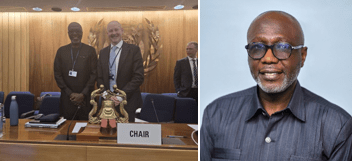Access to nutritious food in adequate quantities by all those who need it is a fundamental human right all nations and global institutions must strive to afford the world’s citizens.
This right is recognized under international law and it is inextricably linked to the right to life, dignity and well-being as enshrined in a plethora of international conventions.
Director-General of the Ghana Maritime Authority, Navy Captain Kamal-Deen Ali (Rtd.) said these at the 18th Inters-Sessional Workshop Group on Greenhouse Gases in London.
The workshop, organized by the International Maritime Organisation (IMO) – an agency of the United Nations – discussed and finalized global decisions on greenhouse reduction measures in the shipping industry.
Dr. Ali commended a committee of the IMO for thoroughly examining and assessing the impact of the measures to curb greenhouse emissions on food security, saying that was extremely helpful in the decision-making process.
The Ghanaian delegation took cognizance of the committee’s findings relating to the impact of maritime logistics costs – which are likely to go after the adoption of the measures – on food security. “We reiterate that the concerns with the impact on food security for Ghana does not only pertain to essential food commodities, but also to critical agricultural inputs, such as fertilizers and machinery, that would ensure food security for our country and many other countries in Africa,” the Director-General observed.
He stressed that, “The negative impact on food security will therefore increase the food import wage bill and erode livelihoods of millions of people in Africa.” While over 90percent of globally traded goods is transported by sea, the maritime industry is, at the same time, a significant contributor to greenhouse gas emissions, primarily through the burning of fossil fuels by ships.
The IMO has thus been actively working on reducing greenhouse emissions from ships and has since July 2023, set an ambitious target of net-zero emissions by or around 2050. The measures to curb emissions will in turn impact food security in many parts of the world, something the Ghanaian delegation was chiefly concerned about.
Ghana, therefore, called for further empirical assessment of the impact on food security in developing countries before the approval of the measures.
This, Dr Ali observed would ensure that remedial measures are put in place to mitigate the effects before the adoption of the measures. “We want to emphasize that addressing negative impact on food security is a humanitarian issue and a responsibility of the (International Maritime) Organization, and should take center stage in whichever measure(s) that would be adopted,” the GMA DG emphasized.










